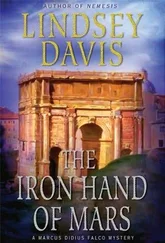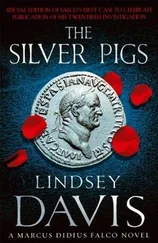Lindsey Davis - The Ides of April
Здесь есть возможность читать онлайн «Lindsey Davis - The Ides of April» весь текст электронной книги совершенно бесплатно (целиком полную версию без сокращений). В некоторых случаях можно слушать аудио, скачать через торрент в формате fb2 и присутствует краткое содержание. Год выпуска: 2013, ISBN: 2013, Издательство: Minotaur Books, Жанр: Исторический детектив, на английском языке. Описание произведения, (предисловие) а так же отзывы посетителей доступны на портале библиотеки ЛибКат.
- Название:The Ides of April
- Автор:
- Издательство:Minotaur Books
- Жанр:
- Год:2013
- ISBN:9781250023698
- Рейтинг книги:3 / 5. Голосов: 1
-
Избранное:Добавить в избранное
- Отзывы:
-
Ваша оценка:
- 60
- 1
- 2
- 3
- 4
- 5
The Ides of April: краткое содержание, описание и аннотация
Предлагаем к чтению аннотацию, описание, краткое содержание или предисловие (зависит от того, что написал сам автор книги «The Ides of April»). Если вы не нашли необходимую информацию о книге — напишите в комментариях, мы постараемся отыскать её.
The Ides of April — читать онлайн бесплатно полную книгу (весь текст) целиком
Ниже представлен текст книги, разбитый по страницам. Система сохранения места последней прочитанной страницы, позволяет с удобством читать онлайн бесплатно книгу «The Ides of April», без необходимости каждый раз заново искать на чём Вы остановились. Поставьте закладку, и сможете в любой момент перейти на страницу, на которой закончили чтение.
Интервал:
Закладка:
The truth is, after I was brought to Rome by the family who adopted me, I had to learn fast about the people and the place; as a result I often know more about the myths and monuments than most of the city's natives. I was about fifteen then, and curious about the world. Education was made available. While being taught to read and write, I devoured facts. Sometimes now it helped in my work. More often, it just made me marvel at the weird history and attitudes of these Romans, who believed themselves masters of the civilised world.
At least they had a history. They knew their origins, which was more than I could say.
The temple was home to a Triad: three gods, bunking up together, all holy and cosy amid the incense and deposited must cakes. In addition to Ceres the Earth Mother, a well-built dame bearing sheaves of corn who was one of the twelve grand Olympian deities, it also housed Liber and Libera, two lesser gods that I bet you've never heard of, Ceres' children, I think. This triple cult was rooted in fertility rites-well may you groan!
Needless to say, an organised body of religious-minded women fussed about the temple. No serious shrine can fail to have such busy-bodies importantly organising themselves into a sniffy coven; it's one way local matrons can get out of the house once a week. My grandmother loved it-a bunch of upper-crust women dabbling in neighbourhood benevolence, heads down over gossip, then having wine together afterwards without their husbands daring to disapprove. My senatorial grandmama was a wonderful woman, only surpassed by her plebeian counterpart, whose domestic rule was legendary all over the Aventine. If I mentioned her at the stall where she used to buy roots for her broth cauldron, the greengrocer still mimed running for the hills.
A temple cult can be a good argument against letting women control things. Although Ceres was bringer of plenty, especially favouring commoners, I found that her devotees included a scrawny bird who had been spoiled from birth and thought herself very superior. Forget liberality. The public slaves who swept the steps and acted as security directed me to her because I was a woman, for which I would not thank them. Possibly they could see I was a different type entirely and they were hoping for a laugh.
Sisterhood did not feature at our meeting.
The supercilious sanctum queen was called Laia Gratiana. The public slave had told me that; she would not introduce herself, in case I dirtied her name by using it. She was fair and I am dark; that was only the start of the distance between us. I told myself she was older than me, though in fact she may not have been. She behaved like a domineering old matriarch with five generations of cowed family who all feared she might alter her will if they as much as sneezed. Her garments were rich cloth, elegantly draped with many folds, though in a revolting puce colour that some sly dyer must have been delighted to offload on an idiot. When she swept up, intent on facing me down, I felt my hackles rise by instinct. I saw she felt the same-in my view, with much less reason.
"What do you want?"
"I am looking for Manlius Faustus."
"He won't see you."
"Suppose I ask him that myself. I am responding to a public notice he put up."
When I stood my ground, it unsettled her. Grudgingly, she deigned to mention that the aediles worked from an office in a side street alongside the temple. I guess she only told me because I could have found out easily from anyone.
We parted on poor terms. If I had known then that Gratiana and I were to have history, I would have felt even more sour.
My two romantic little sisters believed that being so carefully dressed up as I was that afternoon guaranteed that you would meet the love of your life. Not today, apparently. My first encounter was certainly dire; while I sized up a nondescript building that must be the aediles' headquarters, a male menace barged out into the street and crashed into me. He snorted with irritation. It was his fault, absolutely. He was too busy hunching up to make himself look like a nobody, an effect he achieved without trying. The shifty blaggard was all hemp tunics and chin stubble. Absolutely not my type. Sorry, hopeful sisters!
"Oh, don't bother to apologise! — Is this the aediles' office?" He refused to answer, skulking off head down. Rubbing my bruised arm, I sent a soldier's gesture after him, though I fear it was wasted.
As I tripped inside the building, I replaced a scowl with my bright-eyed charming face, to impress any occupants. There was no one in sight.
Small rooms led off a dark little entrance hall. Beyond it was a meagre courtyard with a miniature fountain in the form of a shell. It produced a trickle of water that glugged in pathetic hiccups, then leaked into a trail of green slime down the outside of the collection bowl. Mosquitoes clustered hopefully.
I stood still for a moment, listening. I didn't knock or clear my throat. My father was a private informer too, and according to some (him, for example), he was the best in Rome. I was trained to take my chance, to open doors, to look around.
You always dream of finding an unattended diary that reveals an eye-watering love affair-not that I ever had. Everyone was too careful now. Under our latest emperor, when people committed adultery-as they did like rabbits, because he was a despot and they needed cheering up-they did not write down details. Domitian saw it as his sacred role to punish scandalous behaviour. His agents were always looking for evidence.
Repression had spread to the aediles. Encouraged by our austere and humourless ruler, the market monitors were extra conscientious these days. They were cracking down on docket-diddling, fraudulent weights and pavement-encroachment, though their most lucrative target was prostitution. Here in their lair, I saw massive armoured chests, where all the fines from miserable bar girls could be stored. Bar girls were fair game for the purity police. Traditionally, whenever a waitress served a customer a drink, he could order a bunk upstairs as a chaser. That's if he wanted to catch the crabs or risk having to slip an officer a backhander if the authorities paid that bar a surprise visit, looking for unregistered whores-and inevitably finding them.
Bribes, I presumed, would go straight into the aediles' belt pouches. Could Manlius Faustus be paid off with a bribe, I wondered? How much of his income came from sweeteners?
The building smelled of dust. It was a place of unused reference scrolls and faded wall maps. Old wooden benches inhabited uncomfortable interview rooms in which members of the public, hauled in for questioning, could be made to feel guilty about the kind of rule infringement everyone expects to get away with. One thing startled me: a cage containing leg irons, though currently no prisoners.
Someone had turned up behind me.
"I see you are admiring our facilities!" I spun around. The charmer, who was neat and suave, purred appreciation of my physical appearance. He pretended to assume I had come for a guided tour. "His eminence has already cleared out the captives today, so I can't show you any, I'm afraid."
Some days the sun just comes out and lightens your world. We understood one another immediately. That magic spark.
I gazed at him, a pleasant experience. He was roughly my age, not a real redhead but he had gingery-brown eyes, hair, eyebrows, beard and moustache, even the fine hairs on the backs of his hands and his arms-the complete matching set. Background? — hard to say, though his accent was cultured. If he worked in a public office he was almost certainly a freedman, probably first-generation. I don't despise ex-slaves. I could be one myself; I shall never even know.
"The used gruel bowl looks recent." I nudged it with my toe. The toe had been pedicured; my sandal was new. I often wore shoes more suitable for a lame old lady, laced from front to ankle, in case I had to do a route march; on this visit I had treated myself to more feminine footwear. The soles would make a mark if I kicked someone, but the uppers consisted of just two thin gold straps on a toe-post. If this clerk was anything of a foot fetishist, my high instep would set his pulse racing. "I'm glad I am not compelled to steal the keys and set someone free behind your back."
Читать дальшеИнтервал:
Закладка:
Похожие книги на «The Ides of April»
Представляем Вашему вниманию похожие книги на «The Ides of April» списком для выбора. Мы отобрали схожую по названию и смыслу литературу в надежде предоставить читателям больше вариантов отыскать новые, интересные, ещё непрочитанные произведения.
Обсуждение, отзывы о книге «The Ides of April» и просто собственные мнения читателей. Оставьте ваши комментарии, напишите, что Вы думаете о произведении, его смысле или главных героях. Укажите что конкретно понравилось, а что нет, и почему Вы так считаете.












